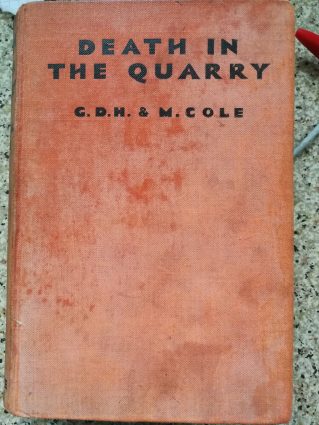 “Welcome, sir, to the Marlock Works, where we are excavating the nearby quarry? What’s that, you want to try out our remote blasting equipment? Well, you can press that switch there, but nothing will happen as we haven’t loaded any explosives. Yes, that did sound like an explosion to me. How strange, that shouldn’t have happened. But it’s Saturday afternoon. Nobody would have been in the quarry so no harm done, sir. Probably…”
“Welcome, sir, to the Marlock Works, where we are excavating the nearby quarry? What’s that, you want to try out our remote blasting equipment? Well, you can press that switch there, but nothing will happen as we haven’t loaded any explosives. Yes, that did sound like an explosion to me. How strange, that shouldn’t have happened. But it’s Saturday afternoon. Nobody would have been in the quarry so no harm done, sir. Probably…”
When the body of the works manager is dug out of the debris, questions are raised about what happened, but at the end of the day, it was probably an accident, admittedly one that causes the man who had some responsibility for it to hang himself. That might have been the end of it, were it not for the somewhat nosey Everard Blatchington and the persistent Superintendent Wilson of CID…
I’ll be honest, I was dreading this one as much as Corpse In Cold Storage. The Coles contributed the second most tedious chapter to The Floating Admiral so I wasn’t desperately excited about the prospect of ticking this box on my “Unread Authors” list. So I was actually rather surprised by this one.
Don’t get me wrong, it’s not one of the great works of detective fiction, but it’s not at all bad. I found Blatchington a bit of a bore – he’s sort of interested in detection but gets bored with it, eventually passing the whole thing over to Wilson, but once Wilson takes over, it does pick up, with the story getting some more focus.
The prose is never dull – something that I wasn’t really expecting to be honest – but there are times when the plot seems to be treading water. Similarly there are times when you can’t quite believe that anyone believes that a murder has taken place – the mechanism for making a murder seem like an accident is like something out of a Rhode novel.
The biggest problem is that a lot of the investigation seemed to relegate the suspects into the background so when the murderer is revealed, there is an element of “Who?” about it. In addition, the murderer is identified by some guesswork – it’s notable that the lack of evidence of their guilt becomes a plot point, as if even the authors admitting the problem.
So I gather, the early Cole titles are the ones worth digging out – I was lucky enough to stumble upon a cheap copy of End Of An Ancient Mariner the other day – but you’ll need a better authority than me as to which exact titles are worth the investment. I gather that the later books go downhill pretty damn fast. But if you were to come across a copy of this one, why not take a look?


Not sure you’ve entirely convinced me to re-try the Coles, but I am equally surprised by you finding your reading experience not as bad as you imagined. I look forward to any other forays you make into their work. Who knows you might find a really good one?
LikeLike
I enjoyed this one, but I agree that the Coles can be very loose; some of their later books have arbitrary solutions. Their best books are Death of a Millionaire, The Man from the River, and the short story “In a Telephone Cabinet”. The Brooklyn Murders and Dead Man’s Watch are also fun.
LikeLike
Oh, wow, if ‘In a Telephone Cabinet’ represents the best of the Coles, I feel no particular urge to try them any time soon… 😛
LikeLike
Oh, why don’t you like it? And you should be read Millionaire at least.
LikeLike
Any thoughts on End Of An Ancient Mariner? Found a cheap copy the other day, wondering how high up the TBR pile it needs to go…
LikeLike
I haven’t read it. It’s supposed to be pretty bad.
Barzun and Taylor didn’t like it:
An attempt to write a full-length inverted tale, which the authors haven’t the ingenuity or patience to clue and construct properly. Almost every scene is dully repeated while the reader and Wilson “wonder”. There is no surprise at the end, so the crime was the obvious and commonplace one from the outset. A few entertaining scenes of no importance and a good use of the phrase “mixed cargo” on the last page.
The Spectator didn’t like it:
Frankly I cannot understand what they are aiming at in their new story. The villain is unmasked for the reader’s benefit early on, yet the reader seems expected to be mystified; all he awaits is some facts concerning what happened in Canada twenty years ago. These facts are not astonishing enough to reward him for plodding through a dull narrative.
The TLS didn’t like it: “There are a good many ragged ends in this complicated tale… Slips of this kind are unforgivable in the mathematics of detective fiction.”
And the New Statesman didn’t like it:
The theme of this Cole story is “murder will out”. “The police are…no more efficient than doctors, or lawyers, or bankers, or any other lot of pundits. But in spite of human frailty” (Inspector Wilson goes on to say) ï do think that the truth has a way of coming uncovered, if only the pure routine is reasonably well organised.” This is an ominous pronouncement. Not content with deflating our hero, the super-sleuth, and our butt, the comic village policeman (Chief-Constable Welsh, of military origin presumably, is allowed to be funny), the Coles simply run amok; they prick the bubble of mystery with their wretched pin of common sense, making it obvious who did the murder and how. Common sense is the bad fairy at the christening where detective fiction is concerned. Only a rag of mystery remains to adorn the motive for disposing of the ancient mariner. There is a superb scene in which a fluffy conventional mother listens to an account of her daughter’s predatory elopement over the telephone, but it is quite irrelevant. Apart from character and social satire, there is nothing to occupy the reader; he waits for Truth to impinge on the policemen. This she does gradually through a series of improbable encounters, her vaunted will to publicity convincing nobody.
Your call, my dear Doctor!
LikeLiked by 2 people
Well, you’ve convinced me… Bottom of the pile it is.
LikeLiked by 1 person
[…] Death In The Quarry by G D H & M Cole – a pleasant surprise. A little meandering but much better than expected. […]
LikeLike